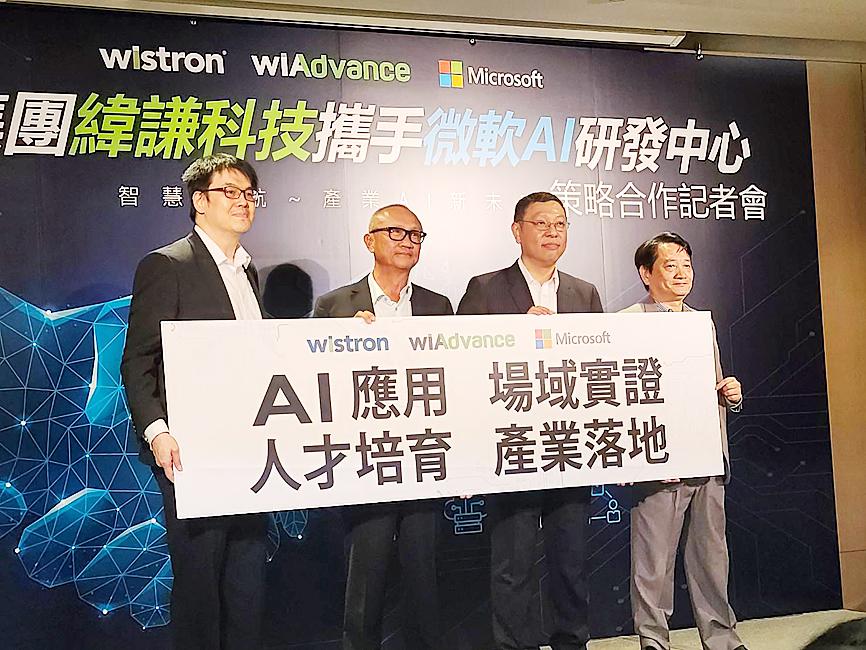Wistron Group (緯創集團) yesterday announced a strategic partnership with Microsoft Corp Taiwan’s artificial intelligence research and development center, whereby the two firms would create an office in Kaohsiung for artificial intelligence and big data-related products and services.
Wistron is also to invest NT$50 million (US$1.69 million) over the next two years to develop new talent in the area, Wistron Corp (緯創資通) vice chairman Robert Huang (黃柏漙) told a news conference in Taipei.
The office is part of the contract electronics manufacturer’s “digital transformation” from an original design manufacturer into a technology service provider, Huang said.

Photo: CNA
“Big data is not just for big business … it is the company’s mission to help all businesses embrace digital technology,” he said.
The Kaohsiung office is to have a strong emphasis on the cultivation of talent, as “we are growing people, not factories,” he added.
Artificial intelligence technologies are being developed for many different industries, and Wistron, in conjunction with Microsoft, plans to use its resources, as well its subsidiary WiAdvance Technology Co’s (緯謙科技) expertise in corporate digital transformation and smart manufacturing, to address various challenges facing local industries, Huang said.
Huang also serves as chairman of WiAdvance.
Tragedies such as the fire that killed six people at a karaoke parlor in Taipei in April could be avoided if inspectors could continually monitor firefighting equipment online, WiAdvance senior technology director Raymond Fan (范振煌) said.
Smart technology could also assist with disease prevention efforts by tracking individual’s movements and body temperature without compromising their privacy, he said.
As an example, Wistron has provided En Chu Kong Hospital (恩主公醫院) in New Taipei City’s Sanxia District (三峽) with a smart healthcare system incorporating remote capabilities.
The system allows medical instructions to be passed to patients and doctors to inspect how wounds are healing remotely, the company said.

In Italy’s storied gold-making hubs, jewelers are reworking their designs to trim gold content as they race to blunt the effect of record prices and appeal to shoppers watching their budgets. Gold prices hit a record high on Thursday, surging near US$5,600 an ounce, more than double a year ago as geopolitical concerns and jitters over trade pushed investors toward the safe-haven asset. The rally is putting undue pressure on small artisans as they face mounting demands from customers, including international brands, to produce cheaper items, from signature pieces to wedding rings, according to interviews with four independent jewelers in Italy’s main

Macronix International Co (旺宏), the world’s biggest NOR flash memory supplier, yesterday said it would spend NT$22 billion (US$699.1 million) on capacity expansion this year to increase its production of mid-to-low-density memory chips as the world’s major memorychip suppliers are phasing out the market. The company said its planned capital expenditures are about 11 times higher than the NT$1.8 billion it spent on new facilities and equipment last year. A majority of this year’s outlay would be allocated to step up capacity of multi-level cell (MLC) NAND flash memory chips, which are used in embedded multimedia cards (eMMC), a managed

In the wake of strong global demand for AI applications, Taiwan’s export-oriented economy accelerated with the composite index of economic indicators flashing the first “red” light in December for one year, indicating the economy is in booming mode, the National Development Council (NDC) said yesterday. Moreover, the index of leading indicators, which gauges the potential state of the economy over the next six months, also moved higher in December amid growing optimism over the outlook, the NDC said. In December, the index of economic indicators rose one point from a month earlier to 38, at the lower end of the “red” light.

Japanese Prime Minister Sanae Takaichi has talked up the benefits of a weaker yen in a campaign speech, adopting a tone at odds with her finance ministry, which has refused to rule out any options to counter excessive foreign exchange volatility. Takaichi later softened her stance, saying she did not have a preference for the yen’s direction. “People say the weak yen is bad right now, but for export industries, it’s a major opportunity,” Takaichi said on Saturday at a rally for Liberal Democratic Party candidate Daishiro Yamagiwa in Kanagawa Prefecture ahead of a snap election on Sunday. “Whether it’s selling food or